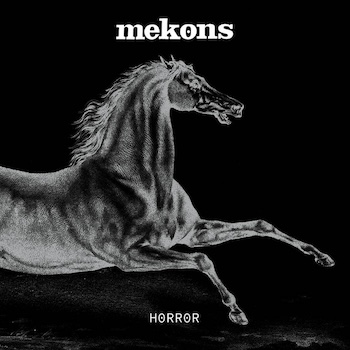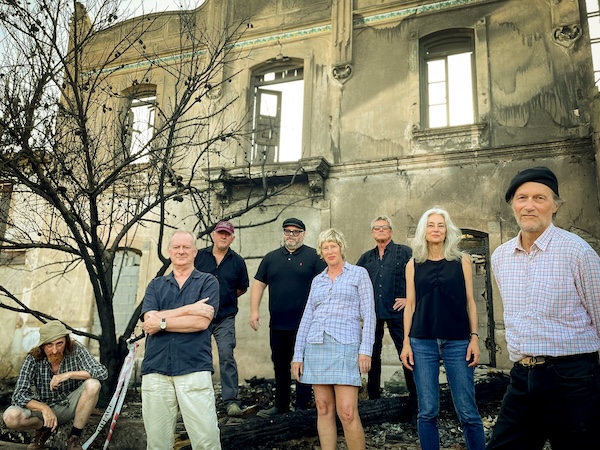Album Review: The “Horror” of the Mekons
By Steve Erickson
The apocalyptic overtones of the Mekons’ music come across as alarmingly real as ever.
Horror, Mekons (Fire Records)

The Mekons had the rare privilege of being able to debut twice. The first time came in 1978, with their singles “Where Were You?” and “Never Been in a Riot.” They’re among the highlights of that era’s postpunk outburst, but the two albums that followed them pleased no one. The band temporarily broke up but, in 1985, after they had fallen off everyone’s radar, the Mekons dropped Fear and Whiskey. The spirits of Hank Williams and Gram Parsons were yanked out of their graves and made to witness Thatcher’s England. In parallel to the Pogues’ music of the same era, the recording infused a punk sensibility into roots music. Whereas Shane MacGowan drew on his own Irish heritage, the Mekons turned to American country and folk music to fashion a voice that would speak about life in a dying empire. Several more classic albums followed: The Edge of the World, Rock’n’Roll, The Curse of the Mekons. Those achievements explain why interest in the band persists, decades after they started out.
The band members were in their late 20s around the time Fear and Whiskey and The Edge of the World were released, and they already sounded tired and weary. Song titles like “Hello Cruel World” and “Hard to Be Human” tell the story. The performers never presented themselves as stars speaking down to their audience. Listening to their music makes one feel the band is traveling down the same road as their fans. Their struggles with the recording industry have only enhanced this empathy. Selling 25,000 copies, the Mekons’s A&M debut Rock’n’Roll was dismissed by the label as a flop, despite having earned ecstatic reviews. The band could not even find an American label to release their next album The Curse of the Mekons. Only the Chicago-based indie Quarterstick finally offered them the necessary stability and support.
Drummer Steve Goulding told me, “No one has ever made a living from the Mekons.” They weren’t too concerned with commercial success: suspicious of A&M, they deliberately left what would have been the most obvious single, “Heaven and Back,” off of the US edition of Rock’n’Roll. There’s no explanation for why they couldn’t have generated as big a fan base as the Pogues or even the Clash (London Calling), except that the Mekons always undercut their most accessible tendencies. “Memphis, Egypt” is an exciting, anthemic rock song that also doubles as a Marxist critique of popular music as a capitalist product. Working with a major label required unhappy compromises, such as editing out the line “this song promotes homosexuality” from their music video “Empire of the Senseless” in order to receive airplay on MTV’s 120 Minutes.
The Mekons’ first album in five years, Horror takes on the roots of present-day political malaise fearlessly. Instead of just raging against the moment, they point out that we’ve been heading right where we are now for centuries: “400 years of stealing and killing, a giant Frankenstein.” The song title “The Western Design” could not be blunter. Beginning in the 1600s, as “John Dee, with his scrying mirror/necromanced the British empire,” lyrics look back at the roots of European imperialism in the Americas: “they couldn’t capture Hispaniola/so they went and found a harbor/the dawn of British empire.” With rhythm guitar strummed on the offbeat (as in reggae), the music situates this story of exploitation in the Caribbean. “War Economy” picks up the story down the road, with a series of one-liners that tell colonizers to fuck off: “physical coercion will not achieve dominance.” “Mudcrawlers,” the album’s catchiest song, relates stories of starving Irish immigrants arriving in the US, with jangly guitar licks ironically mirroring their hopes.

The Mekons today. Photo: courtesy of the artist
Other songs are less directly political, though they still serve as elegies for a country and planet in decline. The ballad “Fallen Leaves” aches as “the dry earth cracks and shadows grow, a dying sun sinks down.” (Its music video depicts two band members as an elderly couple, suggesting the tune may reflect the performers’ feeling about aging.) “You’re Not Singing Anymore” and “A Horse Has Escaped” continue the album’s mix of the personal and political. The latter ponders “were we ever happy or were we never happy?… the ship is sinking, and a horse has escaped.”
Out of the Mekons’ entire discography, Horror lands closest to 1988’s So Good It Hurts, its scrambling of genres undergirding political iconoclasm. Their music’s apocalyptic overtones come across as alarmingly real as ever. One of the Mekons’ enduring concerns has been that oppression makes people miserable. Their ’80s music spoke out of the psychic toll of living with diminished hope for the arrival of political solutions. Horror takes on a more subdued tone. All but two members of their eight-piece lineup sing lead vocals. Because the singers are constantly switching, the album has a somewhat communal feel. It is as if Horror stares into the void and the band draws on its collective strength to find reasons to go on.
Steve Erickson writes about film and music for Gay City News, Slant Magazine, the Nashville Scene, Trouser Press, and other outlets. He also produces electronic music under the tag callinamagician. His latest album, Bells and Whistles, was released in January 2024, and is available to stream here.

I think “mudcrawlers” is about Irish immigrants to Wales rather than the US ,though of course the story is pretty universal see https://www.irishcentral.com/roots/history/irish-famine-mudcrawlers-wales
Great review, fantastic piece of writing